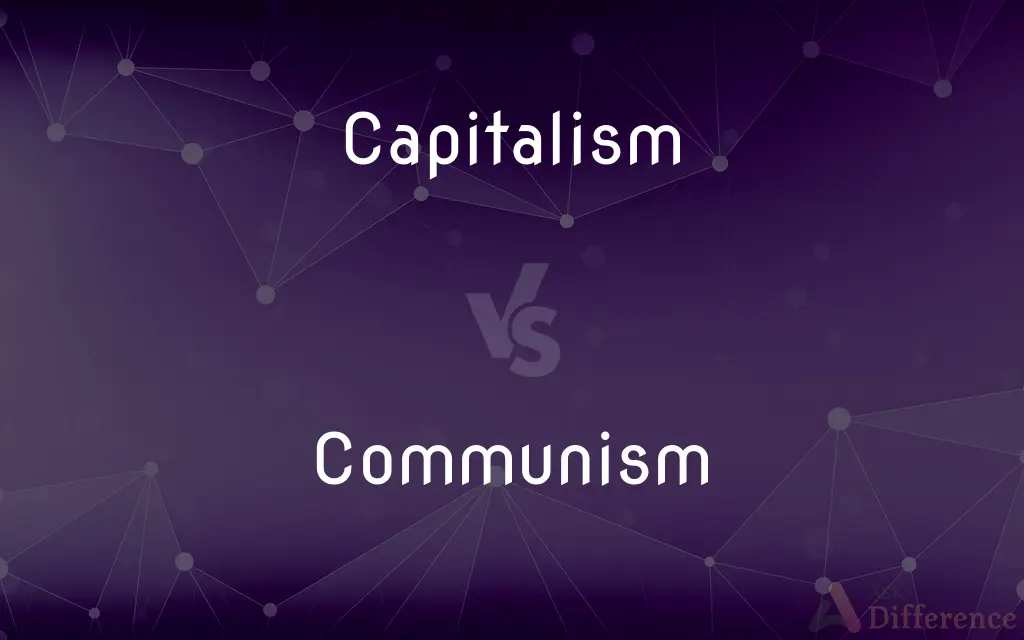Capitalism vs. Communism — What's the Difference?
By Maham Liaqat & Fiza Rafique — Updated on March 25, 2024
Capitalism is an economic system based on private ownership of the means of production and their operation for profit, whereas communism is a socioeconomic system aiming for a classless society where all property is publicly owned.

Difference Between Capitalism and Communism
Table of Contents
ADVERTISEMENT
Key Differences
Capitalism promotes economic freedom, with markets largely free from government intervention, allowing supply and demand to determine prices, production, and the distribution of goods. Communism, on the other hand, seeks to eliminate class distinctions, operating on the principle that the community as a whole should own the means of production, resources, and wealth, with the aim of distributing goods and services to each person according to their need.
In a capitalist society, individuals and businesses own property and the means of production, and competition in the marketplace is encouraged. Profits generated by businesses are reinvested in the economy or distributed to shareholders and employees. In contrast, communism advocates for a society where there is no private ownership, and the state plans and controls the economy with the intention of distributing output without the motive of profit but based on individual needs.
Capitalism is characterized by a stratified social structure where wealth and economic opportunities are not evenly distributed, often leading to significant disparities in income and living standards. Communism aims to create a classless society where wealth and power are equally shared, theoretically eliminating poverty and inequality.
The implementation of capitalism varies widely around the globe, ranging from the laissez-faire type, with minimal government intervention, to welfare capitalism, which includes significant social welfare programs. The implementation of communism has historically been marked by the centralization of power in a single-party state, with varying degrees of success and often criticism for lack of political and economic freedoms.
While capitalism and communism are often presented as diametrically opposed, in practice, countries typically adopt elements of both to various degrees, resulting in mixed economies. The debate between capitalism and communism remains a central theme in discussions on economic philosophy, social justice, and political governance.
ADVERTISEMENT
Comparison Chart
Definition
An economic system based on private ownership and profit.
A socioeconomic system for a classless, stateless society with public ownership.
Ownership
Private individuals and corporations own the means of production.
The community or state owns the means of production.
Economic Structure
Market-based economy with minimal to moderate government intervention.
Planned economy with significant to total government intervention.
Social Structure
Class distinctions based on wealth and economic power.
Aims for a classless society by abolishing private property.
Distribution of Wealth
Based on market forces and individual contribution.
According to needs and abilities, aiming for equal distribution.
Political Systems
Can coexist with various political systems, including democracy.
Historically associated with authoritarian regimes, though not exclusively.
Examples
United States, United Kingdom, Canada.
Soviet Union (historical), Cuba, North Korea.
Goals
Encourage innovation, economic growth, and individual wealth creation.
Eliminate poverty and inequality by distributing wealth equally.
Compare with Definitions
Capitalism
Economic system emphasizing private ownership for profit.
The startup thrived in the capitalist economy, innovating and expanding rapidly.
Communism
Seeks to eliminate social and economic inequality.
The communist ideal is to provide for individuals based on need, regardless of input.
Capitalism
Encourages private investment and entrepreneurship.
She became a successful entrepreneur in a capitalist market, embodying the system's rewards for innovation.
Communism
Aims for a classless society with public ownership.
Under communism, the state aimed to distribute resources equitably to all citizens.
Capitalism
Supports diverse economic policies.
The government introduced tax cuts as a capitalist incentive for business investment.
Communism
Advocates for the abolition of private property.
Communism opposes private wealth accumulation, promoting shared ownership instead.
Capitalism
Can lead to economic disparities.
In capitalist societies, wealth is often unevenly distributed, creating significant disparities.
Communism
Central planning directs economic activities.
The government controlled production and distribution, a hallmark of communist economies.
Capitalism
Promotes free markets and competition.
Capitalism encourages companies to compete, driving technological advancements.
Communism
Historically associated with single-party rule.
Communist states have often been governed by a single political party, limiting political plurality.
Capitalism
Capitalism is an economic system based on the private ownership of the means of production and their operation for profit. Central characteristics of capitalism include capital accumulation, competitive markets, a price system, private property and the recognition of property rights, voluntary exchange and wage labor.
Communism
Communism (from Latin communis, 'common, universal') is a philosophical, social, political, and economic ideology and movement whose ultimate goal is the establishment of a communist society, namely a socioeconomic order structured upon the ideas of common ownership of the means of production and the absence of social classes, money, and, in some cases, the state. As such, communism is a specific form of socialism.
Capitalism
An economic system in which the means of production and distribution are privately or corporately owned and development occurs through the accumulation and reinvestment of profits gained in a free market.
Communism
A theoretical economic system characterized by the collective ownership of property and by the organization of labor for the common advantage of all members.
Capitalism
(politics) A socio-economic system based on private ownership of resources or capital.
Communism
A system of government in which the state plans and controls the economy and a single, often authoritarian party holds power, claiming to make progress toward a higher social order in which all goods are equally shared by the people.
Capitalism
(economics) An economic system based on private ownership of the means of production and their operation for profit.
Communism
The Marxist-Leninist doctrine advocating revolution to overthrow the capitalist system and establish a dictatorship of the proletariat that will eventually evolve into a perfectly egalitarian and communal society.
Capitalism
A socio-economic system based on private property rights, including the private ownership of resources or capital, with economic decisions made largely through the operation of a market unregulated by the state.
Communism
Any far-left political ideology or philosophy advocating holding the production of resources collectively, especially by seizing it through revolution.
Capitalism
An economic system based on the abstraction of resources into the form of privately owned capital, with economic decisions made largely through the operation of a market unregulated by the state.
Communism
Any political social system that implements a communist political philosophy.
Capitalism
An economic system based on predominantly private (individual or corporate) investment in and ownership of the means of production, distribution, and exchange of goods and wealth; contrasted with socialism or especially communism, in which the state has the predominant role in the economy.
Communism
The international socialist society where classes, money, and the state no longer exist.
Capitalism
An economic system based on private ownership of capital
Communism
A scheme of equalizing the social conditions of life; specifically, a scheme which contemplates the abolition of inequalities in the possession of property, as by distributing all wealth equally to all, or by holding all wealth in common for the equal use and advantage of all.
Communism
A form of socialism that abolishes private ownership
Communism
A political theory favoring collectivism in a classless society
Common Curiosities
How do capitalism and communism affect individuals' daily lives?
In capitalism, individuals have more freedom to pursue economic interests and wealth, whereas communism aims to distribute wealth and resources based on communal needs, affecting access to goods, services, and economic opportunities.
Can a country be both capitalist and communist?
No, because the core principles of capitalism and communism are inherently opposed, but countries often implement mixed economies with elements of both.
What role does government play in capitalist and communist systems?
In capitalism, the government's role varies from minimal intervention to providing social welfare, whereas in communism, the government typically plays a central role in planning and controlling the economy.
Can capitalism lead to monopoly?
Yes, without regulation, capitalism can lead to monopolies where single entities control entire sectors, potentially stifling competition and innovation.
What are the advantages of capitalism?
Capitalism is credited with driving innovation, economic growth, and offering individuals the freedom to create wealth, although it can also lead to inequality.
Why do critics argue against communism?
Critics argue that communism, in practice, often leads to economic inefficiency, lack of freedom, and authoritarian governance, citing historical examples where communist regimes failed to achieve their idealistic goals.
What is the fundamental difference between capitalism and communism?
The fundamental difference lies in the ownership of the means of production: private and for-profit in capitalism, versus public and for communal benefit in communism.
How does communism propose to eliminate social classes?
By abolishing private property and distributing wealth and resources according to each person's needs, theoretically removing the economic foundations of class division.
Has pure communism ever been achieved?
While many states have attempted to implement communist principles, critics and historians argue that no country has achieved pure communism as envisioned by its foundational theorists.
Why is economic inequality a concern in capitalist societies?
Economic inequality can lead to social unrest, limit access to healthcare, education, and opportunities for the economically disadvantaged, challenging the sustainability and fairness of the system.
Share Your Discovery

Previous Comparison
Monomath vs. Polymath
Next Comparison
Joy vs. PleasureAuthor Spotlight
Written by
Maham LiaqatCo-written by
Fiza RafiqueFiza Rafique is a skilled content writer at AskDifference.com, where she meticulously refines and enhances written pieces. Drawing from her vast editorial expertise, Fiza ensures clarity, accuracy, and precision in every article. Passionate about language, she continually seeks to elevate the quality of content for readers worldwide.















































